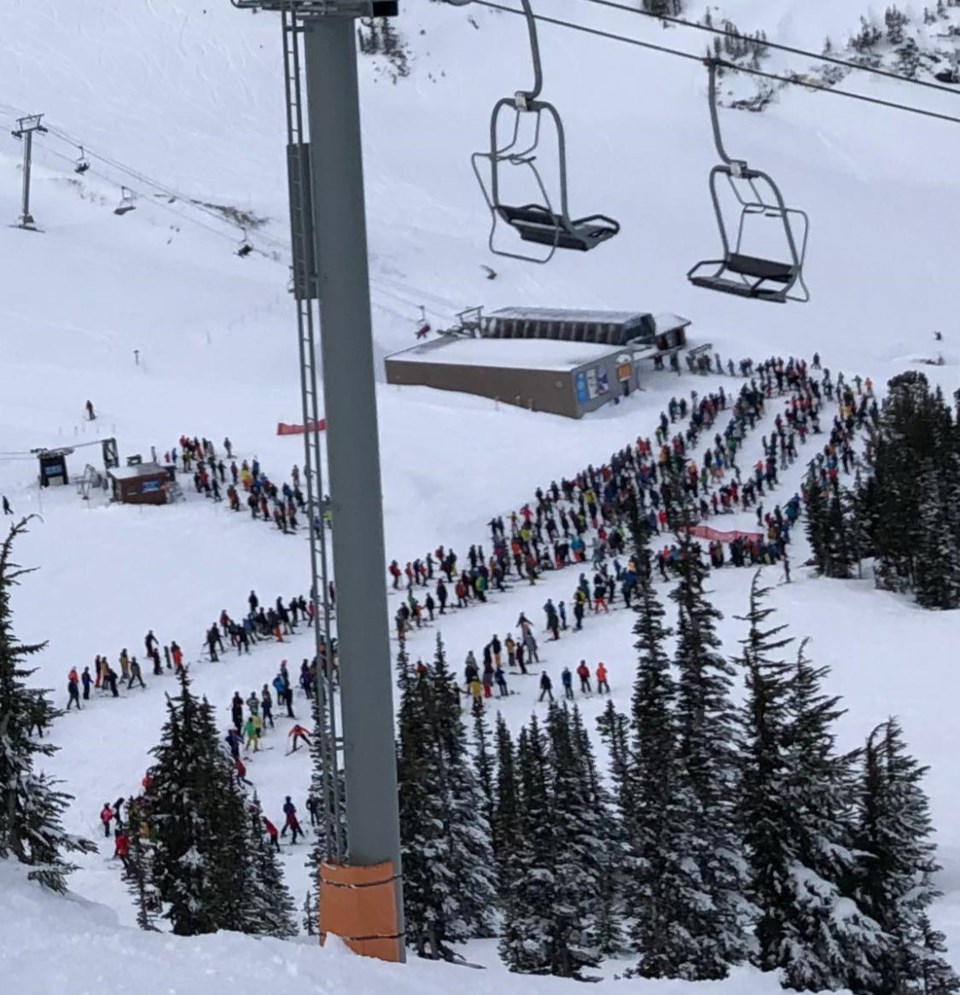Whistler Blackcomb (WB) is not considering a ban on skiers from outside the region after another B.C. resort limited access to locals amidst the coronavirus pandemic.
On Jan. 8, Big White Ski Resort took the unusual step of cancelling all bookings from non-local customers after B.C extended health restrictions until Feb. 5. The resort’s senior vice-president, Michael J. Ballingall, told media the decision was “not about the bottom line; it’s about bending the curve and staying open for our season passholders and local skiers and boarders.”
Big White has been dealing with a COVID outbreak since the first two cases linked to the ski resort near Kelowna were confirmed last month. In its Jan. 15 update, Interior Health reported the ski resort town’s cluster had grown to 175 cases, with 110 of those residing on Big White Mountain. There are 32 people with known active cases.
By comparison, the Howe Sound health region, which comprises Whistler, Pemberton, Squamish, Lions Bay and parts of the southern Stl’atl’imx Nation, had 503 confirmed cases for the entirety of 2020, according to the BC Centre for Disease Control. (Community-specific numbers are not publicized under a certain threshold due to medical privacy reasons.)
Vail Resorts’ West Coast communications director Marc Riddell said the company has followed Vancouver Coastal Health’s guidance on health protocols and is stressing “personal responsibility” to the public in obeying health orders and advisories.
“What we’ve said from the get-go is that we expect people to follow the recommendations of the provincial health officer,” he said. “We work very closely with the health authority and for us, that’s always in their purview if they decide to be a bit more restrictive, and that is something we would of course have to follow.”
Talk of a possible interprovincial travel ban has reached a fevered pitch both locally and provincially in recent days. Last week, in a French-language interview with CBC Radio-Canada, Whistler emergency physician Dr. Annie Gareau called for a travel ban after seeing a “worrying” number of patients from Ontario and Quebec over the holidays. Premier John Horgan, meanwhile, said last Thursday, Jan. 14 that the province was seeking legal advice on the measure, a move the tourism industry warned could cripple a sector already fighting to survive the pandemic. Provincial Health Officer Dr. Bonnie Henry has also urged skiers to stick to their local mountain, but commented recently that a travel ban was unlikely to work, given how many ways there are to enter the province.
“It’s hard to see how that is feasible,” she said in a daily presser last week.
Unlike Big White, “the only game in town,” Riddell said numerous sectors and businesses rely on WB to keep Whistler’s economic engine running.
“It’s a little bit of a different dynamic for us,” he said. “Our employees need to work; they need to get paid. It’s not just the resort that relies on us, it’s all the businesses and the community itself that rely on us to be open.”
With a reduced staff and a flurry of new health protocols in place, Riddell said the challenge of COVID-19 has “galvanized” staff across all of WB’s operations.
“Everybody has really taken up the mantra that we needed to open as safely as possible, and in order for us to stay open for the remainder of the season, everybody needed to lean in,” he noted. “What you’re seeing are people from all walks of our business taking responsibility.”
WB has also confirmed that a number of staff may have been recently exposed to COVID-19 and are currently in self-isolation, based on VCH guidance and its own internal policies.
“There is no impact to staffing or operations and the Whistler Blackcomb team is supporting those employees impacted,” a statement read.
Across the company, Vail Resorts, on Jan. 15, reported certain ski-season metrics for its North American resorts. Through Jan. 3, total skier visits were down 16.6 per cent compared to the same period last year, while season-to-date lift revenue was down 20.9 per cent. Ski-school revenue, meanwhile, dropped 52.6 per cent and dining revenue was down 66.2 per cent.
“Visitation was particularly impacted in regions where heightened COVID-19 related restrictions exist, including Whistler Blackcomb, Tahoe and Vermont,” Vail Resorts CEO Rob Katz said in a release. “We are pleased with the resilience of our guest demand, with local visitation at our western resorts in line with our prior year results and destination visitation supported by our strong season pass sales results leading into the season.
“Despite the challenging environment and specific capacity impacts of COVID-19, we are pleased with our overall revenue performance compared to the prior year period, which we believe demonstrates the value of our long-term advanced commitment strategy and the loyalty of our guest base.”




